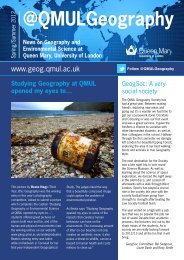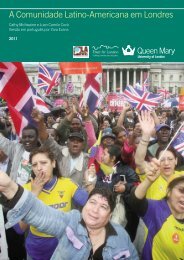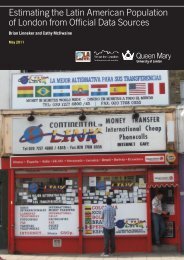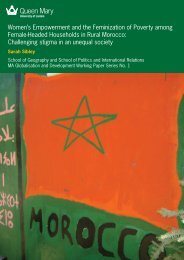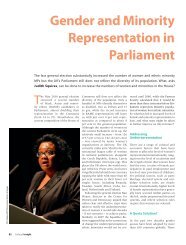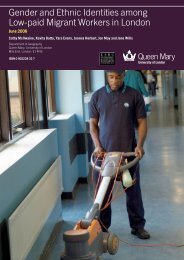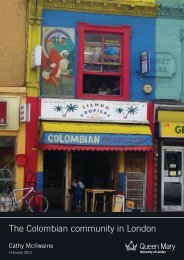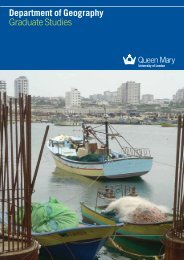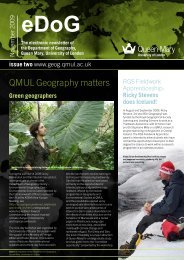Multiculturalism at work: The experiences of Ghanaians in London
Multiculturalism at work: The experiences of Ghanaians in London
Multiculturalism at work: The experiences of Ghanaians in London
- No tags were found...
Create successful ePaper yourself
Turn your PDF publications into a flip-book with our unique Google optimized e-Paper software.
<strong>Multiculturalism</strong> <strong>at</strong> <strong>work</strong>:<strong>The</strong> <strong>experiences</strong> <strong>of</strong> <strong>Ghanaians</strong> <strong>in</strong> <strong>London</strong>November 2006Joanna Herbert, Kavita D<strong>at</strong>ta, Yara Evans,Jon May, C<strong>at</strong>hy McIlwa<strong>in</strong>e, and Jane WillsDepartment <strong>of</strong> GeographyQueen Mary, University <strong>of</strong> <strong>London</strong> Mile End, <strong>London</strong> E1 4NSISBN: 0-902238-39-8
Introduction<strong>The</strong>re is a considerable ongo<strong>in</strong>g popular, political and academic deb<strong>at</strong>e about migr<strong>at</strong>ion and howto respond to and manage cultural and ethnic diversity <strong>in</strong> British society. In particular, recentdiscussions have questioned the benefits <strong>of</strong> multiculturalism as an approach to ethnic differences.<strong>The</strong>se deb<strong>at</strong>es have tended to focus on wh<strong>at</strong> is classified as ‘New Commonwealth’ migrants fromSouth Asia and the Caribbean, and the second and third gener<strong>at</strong>ions from these communities.R<strong>at</strong>her less <strong>at</strong>tention has been paid to the <strong>experiences</strong> <strong>of</strong> less established, smaller and legallydifferenti<strong>at</strong>ed migrant groups (Vertovec, 2006a; Whitehall, 2003; Castles 2003; Berkely, Khanand Ambikaipaker, 2006). However, as Vertovec has noted, it is crucial to <strong>at</strong>tend to the<strong>experiences</strong> <strong>of</strong> these less established groups, as their recent growth has dram<strong>at</strong>ically altered thesocial landscape <strong>of</strong> Brita<strong>in</strong> (Vertovec, 2006a).Draw<strong>in</strong>g on survey d<strong>at</strong>a and <strong>in</strong>-depth <strong>in</strong>terviews, this paper exam<strong>in</strong>es the <strong>experiences</strong> <strong>of</strong><strong>Ghanaians</strong> liv<strong>in</strong>g and <strong>work</strong><strong>in</strong>g <strong>London</strong>, and the implic<strong>at</strong>ions <strong>of</strong> their <strong>experiences</strong> for currentdeb<strong>at</strong>es about multiculturalism and diversity management. In particular, the paper exam<strong>in</strong>es thisgroup’s <strong>experiences</strong> <strong>in</strong> the <strong>work</strong>place, po<strong>in</strong>t<strong>in</strong>g to widespread and persistent feel<strong>in</strong>gs <strong>of</strong> exclusionand racism <strong>in</strong> Brita<strong>in</strong>’s low-paid labour market, and the responses th<strong>at</strong> people make to this.<strong>The</strong>se <strong>experiences</strong> problem<strong>at</strong>ize current deb<strong>at</strong>es about multiculturalism. Specifically, it is arguedth<strong>at</strong> r<strong>at</strong>her than abandon<strong>in</strong>g multiculturalism as a policy, the need is to engage with the problems<strong>of</strong> racism and m<strong>at</strong>erial <strong>in</strong>equalities th<strong>at</strong> affect less established and, <strong>in</strong> particular, low paid migrantgroups.<strong>Multiculturalism</strong>Official policy responses <strong>in</strong> Europe to immigr<strong>at</strong>ion post-1945 have <strong>in</strong>cluded assimil<strong>at</strong>ionism(France), gastarbeider, which is based on the denial <strong>of</strong> political citizenship to migrant <strong>work</strong>ers(Germany) and multiculturalism (Sweden, the Netherlands, Brita<strong>in</strong>) (Rex and S<strong>in</strong>gh, 2003).<strong>Multiculturalism</strong> has been subject to compet<strong>in</strong>g def<strong>in</strong>itions and has been used to both describe anethnically diverse society and to def<strong>in</strong>e the approach <strong>in</strong> terms <strong>of</strong> policy and philosophy tomanag<strong>in</strong>g th<strong>at</strong> society (Malik, 2005). In Brita<strong>in</strong> the diversity cre<strong>at</strong>ed by migr<strong>at</strong>ion has been seenas cre<strong>at</strong><strong>in</strong>g particular dilemmas th<strong>at</strong> need to be overcome; namely how to reconcile the balancebetween foster<strong>in</strong>g a common sense <strong>of</strong> belong<strong>in</strong>g whilst <strong>at</strong> the same time respect<strong>in</strong>g cultural
differences and plural identities. Despite the divergent discourses on multiculturalism the termbroadly conveys the efforts to promote tolerance, respect and recognition for different ethnicgroups with<strong>in</strong> a limited st<strong>at</strong>e-bounded territory (Schuster and Solomos, 2001). In contrast toassimil<strong>at</strong>ionist approaches, which place onus on m<strong>in</strong>ority ethnic groups to adapt to an imag<strong>in</strong>edhomogenous British n<strong>at</strong>ional culture, multiculturalism is based on the understand<strong>in</strong>g th<strong>at</strong> eachgroup is dist<strong>in</strong>ctive and has a right to reta<strong>in</strong> cultural dist<strong>in</strong>ctiveness. If groups are not beoppressed, marg<strong>in</strong>alised and excluded, social equality and protection from discrim<strong>in</strong><strong>at</strong>ion must bekey facets <strong>of</strong> multiculturalism. Indeed, the orig<strong>in</strong>s <strong>of</strong> multiculturalism <strong>in</strong> Brita<strong>in</strong> and the US canbe traced back to the struggles by m<strong>in</strong>ority ethnic activists who fought aga<strong>in</strong>st racism particularly<strong>in</strong> the <strong>work</strong>place (Sivanandan, 1981, 2006).With<strong>in</strong> this broad frame<strong>work</strong>, different forms <strong>of</strong> multiculturalism can be identified. ‘Weak’multiculturalism refers to the understand<strong>in</strong>g th<strong>at</strong> cultural differences should be recognised <strong>in</strong> thepriv<strong>at</strong>e sphere, but should not impose on the public doma<strong>in</strong> <strong>of</strong> law, government, the market,educ<strong>at</strong>ion and employment (Rex, 1991). However, a key problem with this is th<strong>at</strong> some<strong>in</strong>stitutions straddle the priv<strong>at</strong>e and public doma<strong>in</strong>. Educ<strong>at</strong>ion, for <strong>in</strong>stance, is a public <strong>in</strong>stitutionyet it also imparts priv<strong>at</strong>e moral values to students. Moreover, <strong>in</strong>stitutions <strong>in</strong> the public doma<strong>in</strong>are not ‘neutral’ <strong>in</strong> rel<strong>at</strong>ion to questions <strong>of</strong> ethnicity. <strong>The</strong> labour market, for example, results <strong>in</strong>sharp p<strong>at</strong>ters <strong>of</strong> ethnic and gender segment<strong>at</strong>ion. ‘Boutique multiculturalism’ is also seen as aweak type <strong>of</strong> multiculturalism th<strong>at</strong> has turned m<strong>in</strong>ority ethnic groups <strong>in</strong>to an ‘exotic other’ andfailed to go beyond a tokenistic celebr<strong>at</strong>ion <strong>of</strong> ‘saris, somosas and steel bands’ (Harris, 2001;Alibhai-Brown, 2000).Conversely, ‘strong’ multiculturalism has been promoted by scholars such as Talyor who haveargued th<strong>at</strong> recognition is a vital human need and th<strong>at</strong> multiculturalism should go beyond <strong>at</strong>olerance <strong>of</strong> different cultures and grant people equal respect and worth <strong>in</strong> the public sphere(Taylor, 1994). Taylor’s approach has also been labelled as ‘primordial’ multiculturalism <strong>in</strong> th<strong>at</strong>it assumes a rigid and essentialised view <strong>of</strong> cultural identities, <strong>in</strong> which groups carry a culturalbaggage th<strong>at</strong> is simply passed down between gener<strong>at</strong>ions. In contrast a ‘civic’ form <strong>of</strong>multiculturalism acknowledges th<strong>at</strong> cultures are permeable and dynamic, and urges for dialoguebetween and with<strong>in</strong> communities. This is central to Parekh’s claims th<strong>at</strong> multiculturalism as a2
esponse to cultural diversity <strong>in</strong> society ‘might welcome and cherish it [difference], make itcentral to its self-understand<strong>in</strong>g, and respect the demands <strong>of</strong> its constitut<strong>in</strong>g communities’ (2006:6). From this perspective <strong>in</strong>tegr<strong>at</strong>ion is a two way process (Modood, 2005). <strong>The</strong>re are those,however who have made a more radical critique <strong>of</strong> multiculturalism argu<strong>in</strong>g th<strong>at</strong> the focus oncultural recognition and cultural differences masks important power differentials and <strong>in</strong>justices,particularly those associ<strong>at</strong>ed with the economy. Fraser for example, has argued for a social justiceapproach to multiculturalism which recognises th<strong>at</strong> economic disadvantage is entangled withcultural disrespect and needs to be tackled through a comb<strong>in</strong>ed effort to redistribute <strong>in</strong>come andrecognise difference (Fraser, 1995).<strong>Multiculturalism</strong> underp<strong>in</strong>ned a range <strong>of</strong> policies developed dur<strong>in</strong>g the 1980s <strong>in</strong> countries such asBrita<strong>in</strong>, such as the celebr<strong>at</strong>ion <strong>of</strong> cultural diversity and f<strong>in</strong>ancial support for ethnic-m<strong>in</strong>orityrel<strong>at</strong>edactivities and community associ<strong>at</strong>ions, and has tended to have been employed differentlyacross different sectors - <strong>in</strong>clud<strong>in</strong>g educ<strong>at</strong>ion, health, social welfare, politics and employment.Educ<strong>at</strong>ion was one <strong>of</strong> the first areas where the concept was converted <strong>in</strong>to st<strong>at</strong>e policy and<strong>in</strong>cluded <strong>in</strong>iti<strong>at</strong>ives to <strong>at</strong>tract more ethnic m<strong>in</strong>ority teachers <strong>in</strong>to schools while also recognis<strong>in</strong>gand celebr<strong>at</strong><strong>in</strong>g a plurality <strong>of</strong> cultures - <strong>in</strong>clud<strong>in</strong>g different religions and histories with<strong>in</strong> theN<strong>at</strong>ional Curriculum. In the <strong>work</strong>place, the ethos <strong>of</strong> multiculturalism was articul<strong>at</strong>ed <strong>in</strong> the 1980sthrough equal opportunities and more recently through ‘diversity management.’ <strong>The</strong>seapproaches have stressed th<strong>at</strong> organis<strong>at</strong>ions should foster an <strong>in</strong>clusive <strong>work</strong>force, facilit<strong>at</strong>eunderstand<strong>in</strong>g between cultures, and elim<strong>in</strong><strong>at</strong>e racism by assess<strong>in</strong>g the merits <strong>of</strong> all employees onan <strong>in</strong>dividual basis.A key criticism <strong>of</strong> these developments was th<strong>at</strong> they failed to go beyond a celebr<strong>at</strong>ion <strong>of</strong>diversity, neglect<strong>in</strong>g to tackle the orig<strong>in</strong>s <strong>of</strong> ethnic discrim<strong>in</strong><strong>at</strong>ion and social <strong>in</strong>justice (Troynaand Carr<strong>in</strong>gton, 1990). Consequently, <strong>in</strong> the 1980s there was a considerable deb<strong>at</strong>e betweensupporters <strong>of</strong> ‘multiculturalism’ and those who favoured ‘antiracism’, though accord<strong>in</strong>g to Brahthis forced people to take sides, despite their commonalties and prevented a productive dialogue(Brah, 1996). In particular, critics <strong>of</strong> the ‘multicultural project’ argued th<strong>at</strong> the focus on assess<strong>in</strong>gpeople as <strong>in</strong>dividuals failed to tackle ‘<strong>in</strong>stitutional racism’ th<strong>at</strong> affects groups, r<strong>at</strong>her than simply<strong>in</strong>dividuals (Pole, 2001; Troyna and William, 1986; Carby, 1982). <strong>The</strong> policy <strong>of</strong> diversity3
management <strong>in</strong> the <strong>work</strong>place has also come under criticism for the presumption th<strong>at</strong> diversityshould be used only as a means to accumul<strong>at</strong>e pr<strong>of</strong>its mean<strong>in</strong>g th<strong>at</strong> bus<strong>in</strong>ess <strong>in</strong>centives are themajor motiv<strong>at</strong>ion for eradic<strong>at</strong><strong>in</strong>g racism. This approach neglects the moral and social motives forprevent<strong>in</strong>g racial exclusions and leaves equal opportunities to the dynamics <strong>of</strong> bus<strong>in</strong>ess andmarket forces (Wrench and Modood, 2000). Research has revealed th<strong>at</strong> whilst some majorcompanies have high pr<strong>of</strong>ile equal opportunities <strong>in</strong>iti<strong>at</strong>ives, few companies actually have seriousplans for the implement<strong>at</strong>ion <strong>of</strong> race equality policies (ibid.). Despite these criticisms, however,there has been a conspicuous lack <strong>of</strong> research <strong>in</strong>to the way <strong>in</strong> which ethnic m<strong>in</strong>orities experience<strong>in</strong>stitutions and <strong>work</strong>place cultures (Solomos, 1999). 1More general criticisms <strong>of</strong> multiculturalism have focused on the ways <strong>in</strong> which multiculturalismcan gener<strong>at</strong>e un<strong>in</strong>tended consequences and new sets <strong>of</strong> problems to resolve. In particular,multiculturalist policies have been heavily criticised for pitt<strong>in</strong>g m<strong>in</strong>ority ethnic groups aga<strong>in</strong>steach other <strong>in</strong> order to compete for fund<strong>in</strong>g and for co-opt<strong>in</strong>g and grant<strong>in</strong>g autonomy to unelected‘ethnic brokers’ who, as male elders, typically suppress the <strong>in</strong>terests <strong>of</strong> less powerful groups,such as women and youths, <strong>in</strong> the <strong>in</strong>terests <strong>of</strong> present<strong>in</strong>g a unified ethnic community (Burlet andReid, 1998; Kundnani, 2002). <strong>Multiculturalism</strong> has also been targeted for presuppos<strong>in</strong>g th<strong>at</strong>different <strong>in</strong>dividuals are equally committed to their culture, thus fail<strong>in</strong>g to recognise the diversepositions <strong>in</strong>dividuals occupy; due to their gender, class, sexuality, life cycle, value systems and soon (Yuval-Davis, 1999).Follow<strong>in</strong>g the conflicts <strong>in</strong> British northern towns <strong>in</strong> the summer <strong>of</strong> 2001 and the bombs <strong>in</strong> July2005 the value <strong>of</strong> multiculturalism has been questioned <strong>in</strong> the political arena and multiculturalismhas been blamed for foster<strong>in</strong>g fragment<strong>at</strong>ions and divisions between ethnic communities <strong>in</strong>Brita<strong>in</strong> (Observer 21 August 2005, Cantle, 2000). Trevor Phillips, head <strong>of</strong> the Commission forRacial Equality has been a key proponent <strong>of</strong> this argument. In 2004, Phillips controversiallyannounced th<strong>at</strong> multiculturalism was effectively moribund, and reasserted his concerns thefollow<strong>in</strong>g year with the dram<strong>at</strong>ic st<strong>at</strong>ement th<strong>at</strong> parts <strong>of</strong> Brita<strong>in</strong> were ‘sleepwalk<strong>in</strong>g tosegreg<strong>at</strong>ion’ (22 September, 2005). Phillips criticised an ‘anyth<strong>in</strong>g goes multiculturalism whichleads to deeper division and <strong>in</strong>equality ... In recent years we’ve focused far too much on the‘multi’ and not enough on the common culture’ (ibid.). More recently, Ruth Kelly, Secretary <strong>of</strong>4
St<strong>at</strong>e for Communities and Local Government, voiced similar concerns th<strong>at</strong> Brita<strong>in</strong>’s m<strong>in</strong>orityethnic communities live <strong>in</strong> segreg<strong>at</strong>ed and isol<strong>at</strong>ed communities (<strong>The</strong> Guardian 24 August 2006).From this perspective, multiculturalism is seen as hav<strong>in</strong>g gone too far and as thre<strong>at</strong>en<strong>in</strong>g thecommon values <strong>of</strong> British society. As a solution to these problems, politicians have called forgre<strong>at</strong>er social cohesion, <strong>in</strong>tegr<strong>at</strong>ion and <strong>in</strong>ter-cultural contact. This is seen by some as a return toearlier discourses <strong>of</strong> assimil<strong>at</strong>ion, exemplified by the emphasis on allegiance to British values - asillustr<strong>at</strong>ed by the promotion <strong>of</strong> citizenship tests (Worley, 2005; Werbner, 2004). With<strong>in</strong> thisdiscourse ‘cultural barriers’ are seen as the pr<strong>in</strong>cipal problem, r<strong>at</strong>her than underly<strong>in</strong>g racisms,<strong>in</strong>equalities and poverty (Kundnani, 2002). Moreover, the discourse <strong>of</strong> polaris<strong>at</strong>ion tends toblame m<strong>in</strong>ority ethnic groups for ‘choos<strong>in</strong>g’ to be segreg<strong>at</strong>ed and <strong>in</strong>ward look<strong>in</strong>g. In short,current deb<strong>at</strong>es about multicultural Brita<strong>in</strong> ignore the impact <strong>of</strong> racial exclusions <strong>in</strong> cre<strong>at</strong><strong>in</strong>gcultural segreg<strong>at</strong>ions and feel<strong>in</strong>gs <strong>of</strong> exclusion.Migr<strong>at</strong>ion<strong>The</strong> migr<strong>at</strong>ion liter<strong>at</strong>ure makes a key dist<strong>in</strong>ction between the migr<strong>at</strong>ion <strong>of</strong> long establishedgroups <strong>in</strong> the 1970s and the ‘new migrants’ who have formed the ma<strong>in</strong> flows <strong>of</strong> migrants to theUK s<strong>in</strong>ce 1991 (Kyambi, 2005; Spence, 2005). New migr<strong>at</strong>ion is characterised by a decrease <strong>in</strong>the proportion <strong>of</strong> New Commonwealth migrants and an <strong>in</strong>crease <strong>in</strong> asylum rel<strong>at</strong>ed immigr<strong>at</strong>ionand net migr<strong>at</strong>ion ma<strong>in</strong>ly from the Middle East and an ‘Other’ c<strong>at</strong>egory which encompasses avariety <strong>of</strong> countries <strong>in</strong>clud<strong>in</strong>g Eastern Europe, Southern and Central America, South-east Asiaand others (Berkely, Khan and Ambikaipaker, 2006). A key fe<strong>at</strong>ure <strong>of</strong> this ‘new migr<strong>at</strong>ion’ is thediversity <strong>in</strong> the migrants’ country <strong>of</strong> orig<strong>in</strong>, produc<strong>in</strong>g wh<strong>at</strong> Vertovec (2006) calls ‘superdiversity’,particularly <strong>in</strong> <strong>London</strong>.Accord<strong>in</strong>g to 2001 census figures, the number <strong>of</strong> black Africans <strong>in</strong> <strong>London</strong> (378,933) has nowsurpassed black Caribbeans (343,567) and Ghanaian migrants are an important element <strong>of</strong><strong>London</strong>’s ‘super diversity.’ <strong>Ghanaians</strong> numbered 46,513 <strong>in</strong> the 2001 census and ranked n<strong>in</strong>th <strong>in</strong>the largest twenty five groups born outside Brita<strong>in</strong> and liv<strong>in</strong>g <strong>in</strong> <strong>London</strong> (Mack<strong>in</strong>tosh 2005).However, whilst there is a grow<strong>in</strong>g body <strong>of</strong> liter<strong>at</strong>ure on <strong>Ghanaians</strong> <strong>in</strong> the UK, this has tended t<strong>of</strong>ocus on issues <strong>of</strong> development and return migr<strong>at</strong>ion (Tiemoko, 2003; Black et al., 2003; Henryand Mohan, 2003). <strong>The</strong>re has been a dist<strong>in</strong>ct lack <strong>of</strong> research on the <strong>work</strong><strong>in</strong>g conditions <strong>of</strong>5
<strong>Ghanaians</strong> <strong>in</strong> Brita<strong>in</strong> and the implic<strong>at</strong>ions <strong>of</strong> their <strong>experiences</strong> <strong>in</strong> terms <strong>of</strong> deb<strong>at</strong>es onmulticulturalism.It is important to consider the context <strong>of</strong> Ghanaian migr<strong>at</strong>ion. Whilst <strong>Ghanaians</strong> are dist<strong>in</strong>ct fromthe New Commonwealth migrants who orig<strong>in</strong><strong>at</strong>ed from the Indian subcont<strong>in</strong>ent and the WestIndies and are part <strong>of</strong> <strong>London</strong>’s super diversity, to characterise Ghanaian migrants as ‘new’ ismislead<strong>in</strong>g. Th<strong>at</strong> is, Ghanaian migr<strong>at</strong>ion did not beg<strong>in</strong> <strong>in</strong> the 1990s but developed <strong>in</strong> the 1960sdue to economic crisis <strong>in</strong> the country, and by the 1980s and early 1990s, 10-20 % <strong>of</strong> <strong>Ghanaians</strong>were liv<strong>in</strong>g outside Ghana (Peil, 1995). Households <strong>of</strong>ten sent a family member to a wide range<strong>of</strong> dest<strong>in</strong><strong>at</strong>ions <strong>in</strong> Africa, the US, the Middle East and Europe with their migr<strong>at</strong>ion tend<strong>in</strong>g to betemporary - with the aim <strong>of</strong> support<strong>in</strong>g their family and diasporic communities, improv<strong>in</strong>g theirstandard <strong>of</strong> liv<strong>in</strong>g and ultim<strong>at</strong>ely acquir<strong>in</strong>g enough capital to establish a bus<strong>in</strong>ess <strong>in</strong> Ghana (Peil,1995; Black et al., 2003; Mohan, 2006). Only <strong>in</strong> the last decade, with <strong>in</strong>creased political andeconomic stability <strong>in</strong> Ghana, has return migr<strong>at</strong>ion become more feasible (Black et al., 2004).<strong>The</strong> research<strong>The</strong> f<strong>in</strong>d<strong>in</strong>gs from this paper are based on a research project th<strong>at</strong> is exam<strong>in</strong><strong>in</strong>g the role andimportance <strong>of</strong> migrants employed <strong>in</strong> low paid sectors <strong>in</strong> <strong>London</strong> <strong>in</strong>clud<strong>in</strong>g care <strong>work</strong>, hospitality,clean<strong>in</strong>g <strong>in</strong> <strong>of</strong>fices and on the <strong>London</strong> Underground, food process<strong>in</strong>g and construction. Althoughthis paper focuses on the <strong>work</strong>place, one <strong>of</strong> the ma<strong>in</strong> aims <strong>of</strong> the research was to ga<strong>in</strong> a moreholistic <strong>in</strong>sight <strong>in</strong>to the migrant <strong>work</strong>er’s lives. Th<strong>at</strong> is, to trace aspects <strong>of</strong> their life prior tomigr<strong>at</strong>ion, to exam<strong>in</strong>e the process <strong>of</strong> migr<strong>at</strong>ion and outside <strong>of</strong> the <strong>work</strong>place, exam<strong>in</strong><strong>in</strong>gquestions <strong>of</strong> identity and reconstructions <strong>of</strong> communities and transn<strong>at</strong>ional net<strong>work</strong>s.<strong>The</strong> f<strong>in</strong>d<strong>in</strong>gs here are drawn from a larger d<strong>at</strong>a set <strong>of</strong> 362 questionnaire <strong>in</strong>terviews and 74 <strong>in</strong>depth<strong>in</strong>terviews with migrant <strong>work</strong>ers. 2 This paper focuses specifically on 163 questionnaireswith black Africans and 65 questionnaires and 18 <strong>in</strong>-depth <strong>in</strong>terviews with <strong>Ghanaians</strong>.Approxim<strong>at</strong>ely half (49%) <strong>of</strong> the <strong>Ghanaians</strong> surveyed were women and <strong>in</strong> the <strong>in</strong>-depth <strong>in</strong>terviewsseven <strong>of</strong> the respondents were men; the majority (12) had come to the UK after 2000. 3Participants for the <strong>in</strong>terviews were contacted through the questionnaire survey and a process <strong>of</strong>snowball<strong>in</strong>g. <strong>The</strong> use <strong>of</strong> contacts to arrange further <strong>in</strong>terviews had a significant impact on the6
quality <strong>of</strong> the <strong>in</strong>terviews. Many <strong>of</strong> the questions rel<strong>at</strong><strong>in</strong>g to immigr<strong>at</strong>ion st<strong>at</strong>us or uptake <strong>of</strong>benefits were highly sensitive and the use <strong>of</strong> a contact helped to reassure the respondents th<strong>at</strong> this<strong>in</strong>form<strong>at</strong>ion would rema<strong>in</strong> confidential. <strong>The</strong> contact may have also helped to traverse the<strong>in</strong>terviewer’s loc<strong>at</strong>ion as an ‘outsider’ who, as an academic researcher, represented an elite<strong>in</strong>stitution. Nevertheless, there was a sense th<strong>at</strong> the <strong>in</strong>terviews gave the respondents theopportunity to divulge their <strong>experiences</strong> to the wider public arena. Arguably, this may have<strong>in</strong>fluenced the respondents’ decision to discuss certa<strong>in</strong> issues such as exclusions with<strong>in</strong> the<strong>work</strong>place.<strong>The</strong> analysis <strong>of</strong> the transcripts draws on both content and narr<strong>at</strong>ive analysis. A narr<strong>at</strong>ive approachseeks to understand the narr<strong>at</strong>or’s overall viewpo<strong>in</strong>t and their agency, and focuses on howsomeone describes events. It <strong>in</strong>cludes <strong>at</strong>tention to fe<strong>at</strong>ures such as the selection <strong>of</strong> <strong>in</strong>form<strong>at</strong>ion,emphasis and silences, evalu<strong>at</strong>ive st<strong>at</strong>ements, as well as overall genres th<strong>at</strong> shape the story. <strong>The</strong>respondent’s narr<strong>at</strong>ives are <strong>in</strong>corpor<strong>at</strong>ed <strong>in</strong> this paper <strong>in</strong> an <strong>at</strong>tempt to identify the ma<strong>in</strong> themesshap<strong>in</strong>g their <strong>experiences</strong>, without los<strong>in</strong>g sight <strong>of</strong> the overarch<strong>in</strong>g story (Franzosi, 1998;Chamberla<strong>in</strong> and Thompson, 1998).Work<strong>in</strong>g conditions<strong>The</strong> questionnaire survey revealed the concentr<strong>at</strong>ion <strong>of</strong> migrants <strong>in</strong> low-paid jobs, which can beseen as evidence <strong>of</strong> an emergent ‘migrant division <strong>of</strong> labour’ <strong>in</strong> which migrants are overrepresented<strong>in</strong> low paid elementary occup<strong>at</strong>ions (May et al., 2006; Spence, 2005). Our surveyalso highlighted the significance <strong>of</strong> black Africans <strong>in</strong> certa<strong>in</strong> sectors. Th<strong>at</strong> is, whilst EasternEuropeans were most numerous <strong>in</strong> hospitality, black Africans ma<strong>in</strong>ly from Ghana or Nigeriamade up 40% <strong>of</strong> <strong>work</strong>ers <strong>in</strong> <strong>of</strong>fice clean<strong>in</strong>g, over two thirds (79%) <strong>of</strong> those employed as cleanerson the <strong>London</strong> Underground and over half <strong>of</strong> care <strong>work</strong>ers surveyed (63%), though manyrespondents had <strong>work</strong>ed <strong>in</strong> a range <strong>of</strong> other occup<strong>at</strong>ions, such as construction and customerservice, prior to their current job. A key f<strong>in</strong>d<strong>in</strong>g from the survey d<strong>at</strong>a was the poor <strong>work</strong><strong>in</strong>gconditions endured by the <strong>work</strong>ers, an experience th<strong>at</strong> was shared by all migrant <strong>work</strong>ers <strong>in</strong> theresearch (Evans et al., 2005). Firstly, levels <strong>of</strong> pay were particularly low. 94% <strong>of</strong> <strong>Ghanaians</strong>earned less than the Gre<strong>at</strong>er <strong>London</strong> Authority Liv<strong>in</strong>g Wage for <strong>London</strong> (£6.70 an hour). 4 76% <strong>of</strong><strong>Ghanaians</strong> did not receive sick pay, over two thirds (71%) had not had an annual pay rise, over7
half (63%) lost pay if they took <strong>of</strong>f <strong>work</strong> for emergencies and 76% received only the st<strong>at</strong>utorynumber, or less <strong>of</strong> paid holidays. 5 Over two thirds (77%) did not have a company pensionscheme. Compla<strong>in</strong>ts concern<strong>in</strong>g poor <strong>work</strong><strong>in</strong>g conditions were shared by all migrant <strong>work</strong>ers <strong>in</strong>our research, however, racism <strong>in</strong> the <strong>work</strong>place emerged as a key theme from the <strong>in</strong>terviews withGhanaian migrants. To protect <strong>in</strong>dividuals, all names have been changed.Racism <strong>in</strong> the labour market<strong>The</strong> respondents conveyed the dist<strong>in</strong>ct sense th<strong>at</strong> <strong>London</strong> and the spaces with<strong>in</strong> the city were notassoci<strong>at</strong>ed with white hostility. Although some respondents recalled <strong>in</strong>cidents whereby whitepeople were made anxious by their presence by, for example, not want<strong>in</strong>g to sit next to them on abus, this was <strong>of</strong>ten balanced with an account <strong>of</strong> a helpful neighbour. Indeed some commented onthe difference between <strong>London</strong> and other cities. Nyana, for example, spent some time <strong>in</strong> Hullprior to com<strong>in</strong>g to <strong>London</strong> and recalled <strong>of</strong> Hull, th<strong>at</strong>: ‘<strong>The</strong>re are a few <strong>of</strong> the black people there,it’s small, so they look <strong>at</strong> you, they are like th<strong>at</strong>, they stare <strong>at</strong> you and when we are com<strong>in</strong>g totheir city they are scared <strong>of</strong> you. It makes me feel bad.’ Consequently, racism <strong>in</strong> their locality wasnot presented as a prime problem r<strong>at</strong>her it was wh<strong>at</strong> they perceived as racist practices <strong>in</strong>employment th<strong>at</strong> were <strong>of</strong> gre<strong>at</strong>er concern. Moreover, it is important to note th<strong>at</strong> respondents didnot tend to report problems caused by colleagues from other m<strong>in</strong>ority ethnic backgrounds.Though one carer described unfair tre<strong>at</strong>ment from a Jamaican nurse, and several reportedtensions with Nigerians, others st<strong>at</strong>ed th<strong>at</strong> it was easier to forge friendships <strong>at</strong> <strong>work</strong> with othermigrant groups. In contrast, the prime problems identified were their exclusion from pr<strong>of</strong>essionaland managerial jobs and their <strong>experiences</strong> <strong>of</strong> racism and ill tre<strong>at</strong>ment by clients, managers <strong>at</strong><strong>work</strong> and white colleagues.<strong>The</strong> respondents stressed how they felt excluded from pr<strong>of</strong>essional and white collar jobs. <strong>The</strong>survey d<strong>at</strong>a showed th<strong>at</strong> 52% <strong>of</strong> the <strong>Ghanaians</strong> <strong>in</strong>terviewed had acquired tertiary level educ<strong>at</strong>ionbefore mov<strong>in</strong>g to Brita<strong>in</strong> and their sense <strong>of</strong> unjust exclusion was portrayed <strong>in</strong> their narr<strong>at</strong>ivesthrough list<strong>in</strong>g the relevant skills they possessed, the authority and responsibilities th<strong>at</strong> came withtheir previous job(s) <strong>in</strong> Ghana, the qualific<strong>at</strong>ions they had acquired both <strong>in</strong> Ghana and Brita<strong>in</strong>,and their various job search str<strong>at</strong>egies. Joshua, for example, had <strong>work</strong>ed as a manager forUnilever <strong>in</strong> Ghana and discussed <strong>at</strong> length his credentials and the skills he had acquired through8
study<strong>in</strong>g for an MBA <strong>at</strong> <strong>London</strong> Metropolitan University: ‘You are the person who has done theMBA, <strong>at</strong> the managerial level <strong>of</strong> do<strong>in</strong>g th<strong>in</strong>g, so you know how to handle people very well, howto deal with cases, how to solve cases and the like, got all this <strong>work</strong>ed out, leadership, personaldevelopment and the like, we’ve been taught all this <strong>in</strong> the MBA.’ However, his educ<strong>at</strong>ionalcapital did not transl<strong>at</strong>e <strong>in</strong>to economic opportunities for him. He reflected:You will not be taken, and sadly I may say th<strong>at</strong> it is also one part the colour, the racism,we don’t see it but it is happen<strong>in</strong>g. Because I’ve been <strong>in</strong> a lot <strong>of</strong> <strong>in</strong>terviews, you f<strong>in</strong>ish,they will tell you they can’t understand you. I know your accent cannot be my accent. Ican’t speak like you do.Joshua clearly felt th<strong>at</strong> he was consistently judged on unfair terms. His experience andqualific<strong>at</strong>ions were disregarded due to his pronunci<strong>at</strong>ion, which acted as a marker <strong>of</strong> difference.He summed his feel<strong>in</strong>gs up with the words, ‘it’s more than frustr<strong>at</strong>ion, more than frustr<strong>at</strong>ion.’This was also a key theme evident throughout Jennifer’s narr<strong>at</strong>ive. In Ghana, Jennifer had<strong>work</strong>ed for a port <strong>in</strong>spection company. <strong>The</strong> post commanded authority as it, ‘was important to thecountry’ and required specific knowledge and skills. As she expla<strong>in</strong>ed: ‘It was more st<strong>at</strong>istics,which I had the flame [for]’. In Brita<strong>in</strong>, Jennifer had decided to <strong>work</strong> <strong>in</strong> the hous<strong>in</strong>g sector andcompleted a relevant course. However, like Joshua, this did not serve as a route <strong>in</strong>to a job <strong>in</strong> thissector. She commented, ‘So wh<strong>at</strong> I have is a certific<strong>at</strong>e. I have never <strong>work</strong>ed <strong>at</strong> it, it is just a, abit frustr<strong>at</strong><strong>in</strong>g sometimes. You know I feel like go<strong>in</strong>g [back to Ghana] because I’d spent fourhundred pounds on it.’ Like Joshua she felt th<strong>at</strong> the costs embodied <strong>in</strong> the certific<strong>at</strong>e, the<strong>in</strong>vestment <strong>of</strong> her time, labour and money did not culm<strong>in</strong><strong>at</strong>e <strong>in</strong> any tangible value. WhilstJoshua’s lack <strong>of</strong> success was expla<strong>in</strong>ed by employers as a m<strong>at</strong>ter <strong>of</strong> his communic<strong>at</strong>iondifficulties, Jennifer’s experience was couched <strong>in</strong> terms <strong>of</strong> her ‘lack <strong>of</strong> experience’. Yet, likeJoshua, she held a strong conviction th<strong>at</strong> this was actually due to racial discrim<strong>in</strong><strong>at</strong>ion. Thisbelief was <strong>in</strong>fluenced by stories from some return migrants th<strong>at</strong> she had spoken to before shemigr<strong>at</strong>ed and was re<strong>in</strong>forced by comments from her friends <strong>in</strong> Brita<strong>in</strong>. As she expla<strong>in</strong>ed:a friend <strong>of</strong> m<strong>in</strong>e told me ‘‘Jennifer this course you are do<strong>in</strong>g <strong>at</strong> university I promiseyou, you are not go<strong>in</strong>g to get <strong>work</strong> with it <strong>in</strong> this country, so why are you worry<strong>in</strong>g9
yourself?’’ You know you hear some <strong>of</strong> these th<strong>in</strong>gs and it’s like, wh<strong>at</strong> are you to do?So does th<strong>at</strong> mean because <strong>of</strong> your colour, wh<strong>at</strong> you want to do, you will not be able todo it. You know, it’s someth<strong>in</strong>g th<strong>at</strong> I’m b<strong>at</strong>tl<strong>in</strong>g with.Clearly, the respondents felt th<strong>at</strong> a tacit hierarchy existed with<strong>in</strong> the labour market th<strong>at</strong>autom<strong>at</strong>ically situ<strong>at</strong>ed them as <strong>in</strong>ferior to British born whites. Whilst care <strong>work</strong> was seen asslightly better than many other jobs, such as serv<strong>in</strong>g fast food, it was generally not therespondents long held ideal career. As Joshua commented on his care job: ‘look<strong>in</strong>g <strong>at</strong> how we’vesuffered, gett<strong>in</strong>g all these qualific<strong>at</strong>ions and go<strong>in</strong>g to somebody who doesn’t care.’Another common theme to emerge from the narr<strong>at</strong>ives was racism from their clients. <strong>The</strong>respondents frequently commented th<strong>at</strong> they were ‘looked down upon’ as carers, but also th<strong>at</strong>their clients typically responded to them with racist <strong>in</strong>sults. However, they also felt th<strong>at</strong> theycould negoti<strong>at</strong>e this. K<strong>of</strong>i for <strong>in</strong>stance, spoke <strong>in</strong> gre<strong>at</strong> depth about the racist reactions from some<strong>of</strong> his clients and their ensu<strong>in</strong>g convers<strong>at</strong>ions, yet he also stressed th<strong>at</strong> with p<strong>at</strong>ience the problemwas surmountable. He summarised the trajectory <strong>of</strong> one case:when I went there for the first time [the client] was mak<strong>in</strong>g some comments about mycolour, I didn’t m<strong>in</strong>d; one, I saw th<strong>at</strong> he was quite old and he can’t help himself, sonow when he’s mak<strong>in</strong>g a comment, mak<strong>in</strong>g comment about my colour, wh<strong>at</strong>ever, I’mthere to help him, so I help him. He is now used to me, let me put it th<strong>at</strong> way. Everytime th<strong>at</strong> I go there, he is now happy, he allows himself for me to help him. Th<strong>at</strong>’s howit is.Pamela shared this evalu<strong>at</strong>ion. When asked to describe her <strong>experiences</strong> <strong>of</strong> care <strong>work</strong> she claimed:‘Honestly it’s really, really quite challeng<strong>in</strong>g, very, very challeng<strong>in</strong>g. Some <strong>of</strong> the clients are likeoh, you know, as soon as some <strong>of</strong> them when they see the sk<strong>in</strong>, they don’t even want you to<strong>at</strong>tend to them <strong>at</strong> all. And sometimes I do understand them cause they’re like, ‘‘oh where’s thisone, where is she from yeah?’’’. However, she concluded: ‘It’s quite difficult with humans, butwith time authority shifts.’10
Whilst racist responses from clients could be both r<strong>at</strong>ionalised and amelior<strong>at</strong>ed over time,differential tre<strong>at</strong>ment from managers and colleagues posed more <strong>in</strong>tractable difficulties. Manyfelt th<strong>at</strong> when they had <strong>work</strong>ed <strong>in</strong> nurs<strong>in</strong>g homes they were tre<strong>at</strong>ed unfairly by permanent nurs<strong>in</strong>gstaff because they were agency staff. Respondents argued th<strong>at</strong> they were given the mostunpleasant and difficult jobs. As Ellen observed, ‘<strong>The</strong>y don’t k<strong>in</strong>d <strong>of</strong> <strong>work</strong> with you…they arek<strong>in</strong>d <strong>of</strong> like, you know, you are agency, they give you the hard jobs to do, hard, hard jobs to do.’This corresponds with other research which has highlighted how discrim<strong>in</strong><strong>at</strong>ion towards migrant<strong>work</strong>ers <strong>in</strong> health care sett<strong>in</strong>gs is partly due to the hierarchical structure <strong>of</strong> British nurs<strong>in</strong>g (Allanet al., 2004). Others recalled examples <strong>of</strong> wh<strong>at</strong> they perceived to be racial discrim<strong>in</strong><strong>at</strong>ion. For<strong>in</strong>stance, Komla commented on one <strong>of</strong> his colleagues <strong>in</strong> his clean<strong>in</strong>g job, say<strong>in</strong>g ‘he wasn’t reallynice to me and for no reason. I just thought he didn’t like black people.’ Accord<strong>in</strong>g to Komla thisracism surfaced when he made a mistake and was l<strong>at</strong>e for <strong>work</strong> one day; an experience th<strong>at</strong> wasechoed by others.Nyana for <strong>in</strong>stance, described <strong>at</strong> gre<strong>at</strong> length a case <strong>in</strong> her first job <strong>in</strong> a food process<strong>in</strong>g factorywhereby she was sent home because she was five m<strong>in</strong>utes l<strong>at</strong>e. <strong>The</strong> money she had spent on hertravel ticket had been wasted, yet she also noticed how this was part <strong>of</strong> a p<strong>at</strong>tern <strong>in</strong> which blackpeople were selected to go home while her white colleagues were not. She recalled theconvers<strong>at</strong>ion with her supervisor th<strong>at</strong> day as she <strong>at</strong>tempted to save her job: ‘ “Someth<strong>in</strong>ghappened and I’m begg<strong>in</strong>g you, not th<strong>at</strong> I’m not l<strong>at</strong>e, I’m try<strong>in</strong>g to say I’m sorry for wh<strong>at</strong> I’vedone”. “No, get out <strong>of</strong> here,” and the way she will shout <strong>at</strong> you and then they all start star<strong>in</strong>g <strong>at</strong>you like th<strong>at</strong>, you feel embarrassed’. This humili<strong>at</strong>ion was heightened by her former st<strong>at</strong>us <strong>in</strong>Ghana. She expla<strong>in</strong>ed, ‘Look where I come from, I’m well <strong>of</strong>f, you don’t do such <strong>work</strong>, althoughwe have such <strong>work</strong>, we don’t do such <strong>work</strong>, I would never go and do such <strong>work</strong> <strong>in</strong> my country.I’m do<strong>in</strong>g this because I need a bit <strong>of</strong> money, look <strong>at</strong> the way this lady is tre<strong>at</strong><strong>in</strong>g me’. AlthoughNyana felt th<strong>at</strong> this was racism, she also felt it was disguised <strong>in</strong> a bureaucr<strong>at</strong>ic language <strong>of</strong>standard procedure. In her words:<strong>The</strong>y will tell you, it’s the procedure, everyth<strong>in</strong>g is their procedure. You knowsomebody is crush<strong>in</strong>g you. <strong>The</strong> other person is do<strong>in</strong>g to you is not right. <strong>The</strong>y tellsomebody the procedure, where are you go<strong>in</strong>g? Who are you go<strong>in</strong>g to tell? <strong>The</strong>11
managers? You tell them, they will say someth<strong>in</strong>g nice to cover it up, you don’t haveanywhere to go.She added: ‘<strong>The</strong>y cover it <strong>in</strong> the modern way, they cover racist k<strong>in</strong>d <strong>of</strong> th<strong>in</strong>gs, they cover it <strong>in</strong> amodern way, you will not f<strong>in</strong>d, but they tre<strong>at</strong> us underground’. Tak<strong>in</strong>g Anthias’ (1999)def<strong>in</strong>ition th<strong>at</strong> a racist practice can be one th<strong>at</strong> produces racist effects and differential tre<strong>at</strong>mentth<strong>at</strong> correl<strong>at</strong>es with ethnic differences, these examples demonstr<strong>at</strong>e how racist practices may coexistwith <strong>of</strong>ficial recognition th<strong>at</strong> it is unacceptable. Mistakes <strong>in</strong> the <strong>work</strong>place serve as a triggerfor differential tre<strong>at</strong>ment. Furthermore it highlights how the respondents were acutely aware th<strong>at</strong>these processes may be presented as unbiased and egalitarian through the language <strong>of</strong>‘procedure.’ As recent developments <strong>in</strong> the field <strong>of</strong> whiteness studies have shown, apparentlyneutral social arrangements and <strong>in</strong>stitutional practices th<strong>at</strong> appear to have no racial prejudice may<strong>in</strong> fact privilege whites and reproduce racial dom<strong>in</strong>ance (for example, Hartigan, 1999).Collectively, the <strong>in</strong>terviews show the many layers and different forms <strong>of</strong> discrim<strong>in</strong><strong>at</strong>ionidentified by the respondents with<strong>in</strong> the labour market, which they saw as hav<strong>in</strong>g a paramountbear<strong>in</strong>g on the job selection process, <strong>in</strong>teractions with clients, colleagues, and supervisors,<strong>in</strong>clud<strong>in</strong>g the implement<strong>at</strong>ion <strong>of</strong> ‘neutral’ policies. This is supported by recent studies. For<strong>in</strong>stance, McGregor’s (2006) research on Zimbabwean nurses also revealed high levels <strong>of</strong><strong>in</strong>stitutional racism <strong>in</strong> priv<strong>at</strong>e nurs<strong>in</strong>g homes, from clients, management and through <strong>in</strong>adequ<strong>at</strong>eprocedures for compla<strong>in</strong>ts. <strong>The</strong> life stories <strong>of</strong> the <strong>Ghanaians</strong> convey the cumul<strong>at</strong>ive impact <strong>of</strong>these <strong>experiences</strong> on the respondents <strong>in</strong> terms <strong>of</strong> the quality <strong>of</strong> their life and well be<strong>in</strong>g, yet a keyf<strong>in</strong>d<strong>in</strong>g was th<strong>at</strong> for those respondents who held a student visa, these problems were givenparticular prom<strong>in</strong>ence. Those who held such a visa did not have settlement rights <strong>in</strong> Brita<strong>in</strong> andwere only legally allowed to <strong>work</strong> twenty hours per week. Although there was a possibility th<strong>at</strong>they could change to a dependent st<strong>at</strong>us or for an employer to apply for a <strong>work</strong> permit, theirsitu<strong>at</strong>ion and future prospects were precarious. This was reflected <strong>in</strong> their narr<strong>at</strong>ives, as theyturned to genres <strong>of</strong> suffer<strong>in</strong>g to frame their stories and emphasise their struggle <strong>in</strong> the face <strong>of</strong>adversity. Nyana, for <strong>in</strong>stance, <strong>in</strong>troduced this <strong>at</strong> the outset. When asked to describe Kumasi <strong>in</strong>Ghana she replied, ‘where I was born it’s very <strong>in</strong>terest<strong>in</strong>g, like I don’t suffer like I have doneover here’, whilst George relayed his story as a series <strong>of</strong> misfortunes, <strong>in</strong>terspersed with12
st<strong>at</strong>ements such as: ‘We have struggled a lot’. Some respondents such as Danso described adouble b<strong>in</strong>d whereby, over the years, they had subscribed to a number <strong>of</strong> courses but failed tocomplete them due to lack <strong>of</strong> funds and the need to <strong>work</strong>; however, they also knew th<strong>at</strong> this was<strong>in</strong> breach <strong>of</strong> their visa and could impede their chances <strong>of</strong> stay<strong>in</strong>g <strong>in</strong> Brita<strong>in</strong>. This predicament hasbeen identified <strong>in</strong> other studies <strong>of</strong> migrants and their dependency on student visas <strong>in</strong> Brita<strong>in</strong>(Ruhs and Anderson, 2006). Research has also shown th<strong>at</strong> due to the need to send remittances,Ghanaian migrants were more likely to stop study<strong>in</strong>g and take up paid employment compared toother West African migrants (Ammassari, 2004). This highlights the importance <strong>of</strong> immigr<strong>at</strong>ionst<strong>at</strong>us <strong>in</strong> understand<strong>in</strong>g the respondents’ feel<strong>in</strong>gs and perceptions <strong>of</strong> exclusion. Moreover, itshows how immigr<strong>at</strong>ion policy <strong>in</strong>tersects with ethnicity. Th<strong>at</strong> is, immigr<strong>at</strong>ion st<strong>at</strong>us cre<strong>at</strong>esimportant l<strong>in</strong>es <strong>of</strong> differenti<strong>at</strong>ion with<strong>in</strong> an ethnic group, and new forms <strong>of</strong> exclusion andpolaris<strong>at</strong>ion between those who can <strong>at</strong> least <strong>at</strong>tempt to establish a career p<strong>at</strong>h <strong>in</strong> Brita<strong>in</strong> and thosewhose progression beyond be<strong>in</strong>g a cheap pool <strong>of</strong> labour is blocked, leav<strong>in</strong>g them disenfranchised(Whitwell, 2003; Ruhs and Anderson, 2006).Responses to exclusions<strong>The</strong> respondents responded to these neg<strong>at</strong>ive <strong>experiences</strong> <strong>in</strong> the <strong>work</strong>place <strong>in</strong> various ways.Some stressed their powerlessness. For example, Nyana st<strong>at</strong>ed th<strong>at</strong> she rout<strong>in</strong>ely felt humili<strong>at</strong>ed<strong>at</strong> <strong>work</strong>, but her only option was to ignore the problem. She claimed, ‘So for the sake <strong>of</strong> your jobyou swallow it. You come back home and talk, talk, talk, it’s not gett<strong>in</strong>g you anywhere [laughs]then the next day you are back there, th<strong>at</strong>’s why you have it.’ For Nyana shar<strong>in</strong>g the problemwith her friends was her only outlet, but this ultim<strong>at</strong>ely proved futile. She lamented: ‘You don’thave the choice. You have to swallow it, swallow it bitterly.’Others claimed th<strong>at</strong> they had developed prevent<strong>at</strong>ive str<strong>at</strong>egies. Ellen, for <strong>in</strong>stance, expla<strong>in</strong>ed th<strong>at</strong>even though racism was <strong>of</strong>ten difficult to p<strong>in</strong>po<strong>in</strong>t, she had developed specific measures to evadethe possibility <strong>of</strong> differential tre<strong>at</strong>ment. She expla<strong>in</strong>ed:I can’t tell if I’ve been discrim<strong>in</strong><strong>at</strong>ed, they haven’t done it straight to my face,because <strong>of</strong> my colour I feel a bit discrim<strong>in</strong><strong>at</strong>ed, you know, <strong>in</strong> some <strong>of</strong> the actions th<strong>at</strong>they do, but with me I know how to play my cards very, very well. If you tryanyth<strong>in</strong>g <strong>in</strong> the health system there’s a lot <strong>of</strong> discrim<strong>in</strong><strong>at</strong>ion, they say we don’t13
discrim<strong>in</strong><strong>at</strong>e a lot, but they discrim<strong>in</strong><strong>at</strong>e a lot, but wh<strong>at</strong> I believe it’s like, if wh<strong>at</strong> I’mdo<strong>in</strong>g, I know I’m right, I make sure I do it nicely, I don’t make a mistake, wh<strong>at</strong>everyou say you don’t get me. It’s when I make a mistake, th<strong>at</strong>’s when you can’t stand onth<strong>at</strong> with your racial <strong>at</strong>titude.A more strik<strong>in</strong>g f<strong>in</strong>d<strong>in</strong>g was the respondents’ conviction th<strong>at</strong> their adverse situ<strong>at</strong>ion, <strong>in</strong> terms <strong>of</strong>their low paid job, was absolutely temporary. Some articul<strong>at</strong>ed this belief <strong>in</strong> terms <strong>of</strong> a religiousnarr<strong>at</strong>ive. Jennifer claimed, ‘I’m a Christian and I believe this situ<strong>at</strong>ion is not go<strong>in</strong>g to bepermanent. Th<strong>at</strong>’s not where I’m go<strong>in</strong>g to end, you hope for this’. Others emphasised th<strong>at</strong> itdepended on their perseverance and commitment. Kessy stressed th<strong>at</strong> she was ‘focus<strong>in</strong>g more’ <strong>in</strong>Brita<strong>in</strong> and this was echoed by others. Florence st<strong>at</strong>ed, ‘here I’m more focused, I’m on my ownI’m more <strong>in</strong>dependent, and I want to strive hard.’ <strong>The</strong> determ<strong>in</strong><strong>at</strong>ion to succeed despite thedifficulties was reflected <strong>in</strong> their positive and active language. Ellen for example, claimed ‘Ireally want to move up, I don’t want to be stuck. ’Cause I’ve seen people who have beenqualified for years and years still <strong>at</strong> the same place, th<strong>at</strong>’s not me. I want to climb up there’;whilst Jennifer claimed, ‘I just want to set up. I feel hungry now.’ This m<strong>in</strong>dset was expressed bythe female respondents r<strong>at</strong>her than the men, and reveals how despite the obstacles, they shared anevalu<strong>at</strong>ion th<strong>at</strong> employment prospects were ultim<strong>at</strong>ely gre<strong>at</strong>er for women <strong>in</strong> <strong>London</strong> than <strong>in</strong>Ghana.<strong>The</strong> responses discussed thus far can be seen as <strong>in</strong>dividual str<strong>at</strong>egies, yet collective responses,which provided altern<strong>at</strong>ive sources <strong>of</strong> respect were also important. <strong>The</strong> survey d<strong>at</strong>a revealed th<strong>at</strong>81% <strong>of</strong> the respondents belonged to a faith based organis<strong>at</strong>ion. Religion has historically played akey role for various migrant groups, provid<strong>in</strong>g a vital social space and help<strong>in</strong>g to ma<strong>in</strong>ta<strong>in</strong> anethnic memory (Burrell and Panayi, 2006). Here too there was ample evidence th<strong>at</strong> the churchhelped to counter some <strong>of</strong> the respondents’ feel<strong>in</strong>gs <strong>of</strong> frustr<strong>at</strong>ion and exclusion. For example,the church was <strong>of</strong>ten described as a respite and sanctuary from their <strong>work</strong> - for Eleanor itprovided support when she had a problem and was ‘like a small family’, whilst Gladys claimed‘there you feel so happy, it’s your people. <strong>The</strong> church th<strong>at</strong> we go to we are appreci<strong>at</strong>ed’. K<strong>of</strong>idef<strong>in</strong>ed his church as <strong>in</strong>clusive and car<strong>in</strong>g:14
In my church, when you get here, you see th<strong>at</strong> you are really <strong>in</strong> a community, you areembraced. Be you a Ghanaian, an American or wh<strong>at</strong>ever, you can be from the churchcommunity and they’ll see you as a church member, straightforward. So they give youa form to fill, your telephone number, it will be there and maybe the elders will becall<strong>in</strong>g you to see how you are feel<strong>in</strong>g, so much <strong>of</strong> the time, you feel <strong>at</strong> home, th<strong>at</strong> ishow my church is.Whilst the church was open to different ethnic groups, many also drew on specifically Ghanaiannet<strong>work</strong>s. <strong>The</strong> respondents frequently spoke <strong>of</strong> other diasporic associ<strong>at</strong>ions th<strong>at</strong> provided social<strong>in</strong>teractions through d<strong>in</strong>ner and dance even<strong>in</strong>gs and meet<strong>in</strong>gs, and which <strong>in</strong>cluded groups basedon language, religion, schools and home town associ<strong>at</strong>ions as well as n<strong>at</strong>ional Ghanaianassoci<strong>at</strong>ions (D<strong>at</strong>ta et al., 2006). Some <strong>of</strong> the respondents clearly drew on a well organised andrich associ<strong>at</strong>ional culture th<strong>at</strong> fulfilled a range <strong>of</strong> functions beyond socialis<strong>in</strong>g, such as self-helpand judicial functions (Peil, 1995; Owusu, 2000; Giles and Mohan, 2003; Mohan, 2006).Another response was their assertion <strong>of</strong> Ghanaian values and neg<strong>at</strong>ive assessment <strong>of</strong> Britishpeople’s behaviour. Indeed, the <strong>in</strong>terviews were replete with st<strong>at</strong>ements about Ghanaian values.This <strong>in</strong>cluded Ghanaian hospitality. As Joshua remarked; ‘like you come <strong>in</strong>to my country, how Iwill feed you, I will embrace you, they call it Ghanaian hospitality and I not f<strong>in</strong>d it here’. Othersemphasised how <strong>Ghanaians</strong> were car<strong>in</strong>g and helped others. For example, Abena’s comment th<strong>at</strong>‘as for <strong>Ghanaians</strong> we are helpers’ was typical. When Komla was asked to describe Accra wherehe was bought up, he replied:Accra is a nice place and you have, people are very nice, more especially when youare a foreigner, they are very nice to you, because it’s k<strong>in</strong>d <strong>of</strong> the ethics there, so faras you were born <strong>in</strong> the home and grew up <strong>in</strong> the home, they give you th<strong>at</strong> k<strong>in</strong>d <strong>of</strong>tra<strong>in</strong><strong>in</strong>g th<strong>at</strong> you have to give respect to elderly people and then you, people youdon’t know, you have to show some k<strong>in</strong>d <strong>of</strong> k<strong>in</strong>dness to them.<strong>The</strong> respondents <strong>of</strong>ten contrasted their will<strong>in</strong>gness to help with <strong>in</strong>stances <strong>in</strong> <strong>London</strong> whereby apasser-by would ignore someone <strong>in</strong> need <strong>of</strong> aid. As mentioned <strong>in</strong> Komla’s quote, respect toelders was described as another core Ghanaian value. Mary expla<strong>in</strong>ed, ‘back <strong>in</strong> Ghana, you15
espect age [laughs]. <strong>The</strong>y respect age and everybody is everybody’s keeper, the child is notnecessarily your child before you can discipl<strong>in</strong>e th<strong>at</strong> child’. This shows how Ghanaian valueswere given a new emphasis <strong>in</strong> the context <strong>of</strong> their <strong>experiences</strong> <strong>in</strong> Brita<strong>in</strong> (Vertovec, 2006). Thiswas most evident <strong>in</strong> Abena’s narr<strong>at</strong>ive. For <strong>in</strong>stance, she claimed, ‘Ghana is better, I preferbecause Ghana is my country and then <strong>in</strong> Ghana …they help us and they protect us. Wh<strong>at</strong> I seehere is, they don’t care about us, especially us black people, they don’t care about us.’ Ghanaianpr<strong>in</strong>ciples were given new mean<strong>in</strong>gs as a result <strong>of</strong> their feel<strong>in</strong>gs <strong>of</strong> exclusion and the disrespectthey had encountered. By emphasis<strong>in</strong>g Ghanaian values, the respondents can also been seen asconstruct<strong>in</strong>g a boundary between themselves and others to protect and enhance their self esteemand dignity (Lamont, 2000). <strong>The</strong> effect <strong>of</strong> the narr<strong>at</strong>ives was to impart the significant messageth<strong>at</strong> whilst the respondents were not economically successful <strong>in</strong> <strong>London</strong>, their code <strong>of</strong> conductand <strong>at</strong>titudes, particularly the respect and compassion they bestowed to others, positioned themas morally superior to the British, particularly <strong>in</strong> a context where they were perceived to be<strong>in</strong>ferior <strong>in</strong> everyday life and society.Compar<strong>at</strong>ive st<strong>at</strong>ements about Ghana and Brita<strong>in</strong> can also be read <strong>in</strong> rel<strong>at</strong>ion to their <strong>experiences</strong><strong>of</strong> the <strong>work</strong>place. Brita<strong>in</strong> was represented as a place <strong>of</strong> educ<strong>at</strong>ional opportunities and facilities,but also <strong>of</strong> <strong>work</strong> and stress. As Mary claimed, ‘<strong>The</strong>re’s so much stress, so, so much stress[laughs], so much stress over here and Ghana is not like th<strong>at</strong>. We enjoy life, every bit <strong>of</strong> it’.Ghana was <strong>in</strong>variably portrayed as the antithesis <strong>of</strong> Brita<strong>in</strong>, and associ<strong>at</strong>ed with sunsh<strong>in</strong>e andfresh food. Jennifer, for example, expressed her frustr<strong>at</strong>ion th<strong>at</strong> she was unable to secure a job <strong>in</strong>hous<strong>in</strong>g and added: ‘Yeah, sometimes you feel like go<strong>in</strong>g back home. [Laughs]. If you th<strong>in</strong>kabout it. Because over there, apart from th<strong>at</strong>, you get your fresh food to e<strong>at</strong>. Everyth<strong>in</strong>g fromfarms is very fresh. Here you always e<strong>at</strong> frozen, frozen, frozen. And we have the we<strong>at</strong>her, it’salways summer.’ <strong>The</strong>se examples portrayed the dist<strong>in</strong>ct sense th<strong>at</strong> their quality <strong>of</strong> life and sense<strong>of</strong> well be<strong>in</strong>g was better <strong>in</strong> Ghana. Others conceded th<strong>at</strong> although the standard <strong>of</strong> liv<strong>in</strong>g washigher <strong>in</strong> Brita<strong>in</strong>, this was ultim<strong>at</strong>ely counteracted by the disrespect they encountered. This wasclearly articul<strong>at</strong>ed by Nyana and her comments followed a discussion <strong>of</strong> the discrim<strong>in</strong><strong>at</strong>ion sheencountered <strong>in</strong> the <strong>work</strong>place:16
It makes you feel, you feel pa<strong>in</strong>, because the happ<strong>in</strong>ess or the m<strong>in</strong>d th<strong>at</strong> you go throughcom<strong>in</strong>g to Brita<strong>in</strong>. I mean the country is very nice to live <strong>in</strong>, it is far better than ourcountry. I’ve been tell<strong>in</strong>g people s<strong>in</strong>ce I came th<strong>at</strong> I have the electricity, [it] does notturn <strong>of</strong>f, shortage <strong>of</strong> w<strong>at</strong>er and those everyday th<strong>in</strong>gs, here they have telephones <strong>in</strong> theirhouses, you have this, you are well <strong>of</strong>f, I mean we don’t, but we’re f<strong>in</strong>e. We don’t havesuch th<strong>in</strong>gs but we’re okay. You have it, but the way we are be<strong>in</strong>g tre<strong>at</strong>ed, sort <strong>of</strong>makes you feel no good, we don’t feel so good.<strong>The</strong>se narr<strong>at</strong>ives <strong>of</strong> home were also gendered, with several women claim<strong>in</strong>g they missed thechildcare support net<strong>work</strong>s th<strong>at</strong> were available to them <strong>in</strong> Ghana, whilst the men tended tolament their higher st<strong>at</strong>us back home as illustr<strong>at</strong>ed by their ownership <strong>of</strong> houses and cars. Georgeclaimed: ‘<strong>in</strong> Ghana I’ve got my own house everyth<strong>in</strong>g liv<strong>in</strong>g all right, good money, my own cars,two priv<strong>at</strong>e cars. I was alright. But here I don’t have noth<strong>in</strong>g. I’m broke and start afresh.’<strong>The</strong> <strong>in</strong>terview narr<strong>at</strong>ives were replete with st<strong>at</strong>ements th<strong>at</strong> juxtaposed Ghana and Brita<strong>in</strong> and theywere a way <strong>of</strong> articul<strong>at</strong><strong>in</strong>g and express<strong>in</strong>g their deep diss<strong>at</strong>isfaction with certa<strong>in</strong> aspects <strong>of</strong> theirlives <strong>in</strong> <strong>London</strong>. Yet they also reveal the contradictions and ambivalence th<strong>at</strong> is <strong>at</strong> the crux <strong>of</strong> themigrant experience (Gardner, 2002). This ambivalence was particularly reflected <strong>in</strong> theirst<strong>at</strong>ements about their economic situ<strong>at</strong>ion as they grappled with the paradox <strong>of</strong> liv<strong>in</strong>g <strong>in</strong> <strong>London</strong>.Th<strong>at</strong> is, whilst <strong>London</strong> <strong>of</strong>fered the opportunity to earn more money compared to Ghana, the cost<strong>of</strong> liv<strong>in</strong>g was also significantly higher. Many st<strong>at</strong>ed <strong>in</strong> the <strong>in</strong>terviews th<strong>at</strong> their wages did notmeet the costs <strong>of</strong> liv<strong>in</strong>g <strong>in</strong> <strong>London</strong> and particular concerns were the high cost <strong>of</strong> travel, counciltax and specifically, rent. Jennifer discussed the economic opportunities <strong>in</strong> Brita<strong>in</strong> but st<strong>at</strong>ed ‘one<strong>of</strong> the ma<strong>in</strong> concerns here is when I convert it <strong>in</strong>to our currency it’s a lot <strong>of</strong> money but becauseyou pay a lot <strong>of</strong> rent it’s mean<strong>in</strong>gless. Back home you’re not pay<strong>in</strong>g as much as this’. Similarly,Komla claimed th<strong>at</strong> he earned more money <strong>in</strong> <strong>London</strong> as cleaner than as an <strong>of</strong>fice <strong>work</strong>er <strong>in</strong>Ghana but he reflected, ‘<strong>in</strong> <strong>London</strong> liv<strong>in</strong>g is quite expensive and for everyth<strong>in</strong>g you have tocherish the pound, you really have to suffer for it and the little you get you have to use too. So ifyou don’t get paid, you can’t e<strong>at</strong>, you have to be really extremely careful before you can save,th<strong>at</strong>’s one th<strong>in</strong>g I don’t like’. As a result, many were ambivalent about their plans for their future,st<strong>at</strong><strong>in</strong>g th<strong>at</strong> they would only stay <strong>in</strong> Brita<strong>in</strong> if they could secure a better job: but they would onlyreturn to Ghana if they could establish their own bus<strong>in</strong>ess.17
Implic<strong>at</strong>ions for multiculturalism<strong>The</strong> ways <strong>in</strong> which respondents drew on religious and ethnic net<strong>work</strong>s and reasserted Ghanaianvalues, could be <strong>in</strong>terpreted as a form <strong>of</strong> self-segreg<strong>at</strong>ion. Th<strong>at</strong> is, these responses could be seenas demonstr<strong>at</strong><strong>in</strong>g a retre<strong>at</strong> <strong>in</strong>to Ghanaian enclaves as opposed to develop<strong>in</strong>g social net<strong>work</strong>s andcontact with the ‘host’ society, and cultiv<strong>at</strong><strong>in</strong>g a sense <strong>of</strong> belong<strong>in</strong>g and solidarity with Brita<strong>in</strong>.However, these net<strong>work</strong>s were clearly part <strong>of</strong> a survival str<strong>at</strong>egy to allevi<strong>at</strong>e the sense <strong>of</strong>exclusion and frustr<strong>at</strong>ion they felt which was not only due to racism, but their poor <strong>work</strong><strong>in</strong>gconditions and poor quality <strong>of</strong> life as a result <strong>of</strong> their low paid <strong>work</strong>. Migrants have historicallydrawn on these forms <strong>of</strong> survival str<strong>at</strong>egies (Herbert, forthcom<strong>in</strong>g), yet <strong>in</strong> the political doma<strong>in</strong>these responses are now stigm<strong>at</strong>ised. However, such survival str<strong>at</strong>egies do not necessarilypreclude engagement <strong>in</strong> the wider society, and might even predic<strong>at</strong>e it. Moreover, many<strong>Ghanaians</strong> actually embraced multicultural liv<strong>in</strong>g by <strong>work</strong><strong>in</strong>g alongside other ethnic groups,<strong>in</strong>teract<strong>in</strong>g with a diversity <strong>of</strong> people and ga<strong>in</strong><strong>in</strong>g knowledge about different cultures. As K<strong>of</strong>ireflected:I came to meet a whole lot <strong>of</strong> people from different countries and I’velearned a lot from such people… Like the way th<strong>at</strong> people live. You seeIndians, their lifestyle is quite different, you see Ch<strong>in</strong>ese, their lifestyle isquite different, you see somebody from Russia, you know wh<strong>at</strong> I mean? Sowith this experience, I’ve learned a lot from such different, different,different people <strong>in</strong> this country.K<strong>of</strong>i’s reflections reson<strong>at</strong>e with Malik’s beliefs on the benefits <strong>of</strong> liv<strong>in</strong>g <strong>in</strong> a multiculturalsociety. Accord<strong>in</strong>g to Malik: ‘Diversity is important not <strong>in</strong> and <strong>of</strong> itself, but because it allows usto expand our horizons, to compare and contrast different values, beliefs and lifestyles and makejudgements upon them (2005: 18). <strong>The</strong> barrier, therefore, was not with other migrant <strong>work</strong>ers butwith the white British. This was confirmed by Nyana:It’s very difficult to get a white as a friend. If you are not born here and youcome from outside the country you can’t get a white as a friend, a Britishperson as a friend. Maybe you are born here and you started school with the18
person and they’ve been <strong>in</strong> the same classroom as yourself. But from othercountries you get other EU people like, because you all come from outsideBrita<strong>in</strong> so we make friendship easier. <strong>The</strong> real British person is not easy--,To make friends with?To make good friends with.<strong>The</strong> current political discourse focuses <strong>at</strong>tention on m<strong>in</strong>ority ethnic groups as caus<strong>in</strong>gfundamental problems for <strong>in</strong>tegr<strong>at</strong>ion, yet white Britons cont<strong>in</strong>ue to evade scrut<strong>in</strong>y <strong>in</strong> thisrespect. <strong>The</strong> perceived barriers underly<strong>in</strong>g rel<strong>at</strong>ionships with white people, alongside <strong>experiences</strong><strong>of</strong> system<strong>at</strong>ic and <strong>in</strong>stitutional racisms, particularly <strong>in</strong> the labour market, highlights th<strong>at</strong> formulticulturalism to function as a two way process, it is vital for white people to change and gobeyond a mere lip-service <strong>of</strong> tolerance (Alibhai-Brown, 2000).Some policy implic<strong>at</strong>ions can also be drawn from the <strong>in</strong>terviews. Most importantly, perhaps,r<strong>at</strong>her than simply abandon<strong>in</strong>g the project <strong>of</strong> multiculturalism, the implement<strong>at</strong>ion <strong>of</strong>multicultural policies needs to be improved. Firstly, the evidence <strong>of</strong> endur<strong>in</strong>g racisms highlightsthe need for anti-racism to be <strong>in</strong>corpor<strong>at</strong>ed <strong>in</strong>to policy agendas. <strong>The</strong> <strong>in</strong>terviews highlighted theresponses <strong>of</strong> the <strong>Ghanaians</strong> to their <strong>experiences</strong> <strong>of</strong> discrim<strong>in</strong><strong>at</strong>ion. Whilst a few emphasised theirpowerlessness, a response th<strong>at</strong> may have <strong>in</strong>tensified the effect <strong>of</strong> racisms by provok<strong>in</strong>gdisengagement and re<strong>in</strong>forc<strong>in</strong>g feel<strong>in</strong>gs <strong>of</strong> exclusion, many responded with a determ<strong>in</strong><strong>at</strong>ion tosucceed and had developed cop<strong>in</strong>g str<strong>at</strong>egies to negoti<strong>at</strong>e difficulties. Yet despite this range <strong>of</strong>responses, the respondents did not use formal procedures <strong>in</strong> the <strong>work</strong>place to challenge racism; <strong>in</strong>fact the <strong>in</strong>terviews highlighted the conspicuous lack <strong>of</strong> <strong>in</strong>stitutional support. Managers play akey role <strong>in</strong> provid<strong>in</strong>g this support by <strong>in</strong>terven<strong>in</strong>g to tackle discrim<strong>in</strong><strong>at</strong>ion, yet help from managerswas also absent <strong>in</strong> the <strong>Ghanaians</strong>’ narr<strong>at</strong>ives and <strong>in</strong>stead, respondents recalled situ<strong>at</strong>ions wherebymanagers dismissed and denied the issue.Secondly, racism was one element <strong>of</strong> the respondents’ poor <strong>work</strong><strong>in</strong>g conditions, which <strong>in</strong>cludedlow levels <strong>of</strong> pay and a lack <strong>of</strong> <strong>work</strong> rel<strong>at</strong>ed benefits such as sick pay and compassion<strong>at</strong>e leave.<strong>The</strong>refore, efforts to tackle racism need to oper<strong>at</strong>e <strong>in</strong> a broader context and go beyond an effort toafford cultural recognition to <strong>in</strong>corpor<strong>at</strong>e economic justice, through for example, a <strong>London</strong> liv<strong>in</strong>gwage (See also Fraser 1995). Accord<strong>in</strong>g to Wrench and Modood equal opportunities are19
‘virtually irrelevant’ for those employed <strong>in</strong> the lowest paid jobs, as improvements <strong>in</strong> general<strong>work</strong><strong>in</strong>g conditions and fairer wages are a gre<strong>at</strong>er priority (2000:2). However, the <strong>in</strong>terviewswith <strong>Ghanaians</strong> reveal th<strong>at</strong> racism did had a significant impact on their lives and should betackled alongside more general improvements <strong>in</strong> their poor <strong>work</strong><strong>in</strong>g conditions.ConclusionWhilst scholars have called for the study <strong>of</strong> less established migrant groups <strong>in</strong> an effort to furtherdevelop our understand<strong>in</strong>g <strong>of</strong> multiculturalism, this paper has responded by focus<strong>in</strong>g on the<strong>experiences</strong> <strong>of</strong> <strong>Ghanaians</strong> <strong>work</strong><strong>in</strong>g <strong>in</strong> <strong>London</strong>’s low-paid labour market. Whilst the respondentsrecognised the benefits <strong>of</strong> liv<strong>in</strong>g <strong>in</strong> a multicultural society and had established contacts with othermigrant groups <strong>at</strong> <strong>work</strong>, diversity management had not penetr<strong>at</strong>ed <strong>at</strong> the level <strong>of</strong> these low paidsectors <strong>in</strong> <strong>London</strong>. <strong>The</strong> core aims <strong>of</strong> multiculturalism, to respect and value ethnic difference andprotect groups from discrim<strong>in</strong><strong>at</strong>ion, were a distant rhetoric th<strong>at</strong> had little bear<strong>in</strong>g on their dailylives. Instead the <strong>Ghanaians</strong> <strong>in</strong>terviewed felt th<strong>at</strong> racism was endemic <strong>in</strong> the labour market, th<strong>at</strong>they were denied opportunities and stuck <strong>at</strong> bottom <strong>of</strong> the employment ladder. For therespondents, racism and discrim<strong>in</strong><strong>at</strong>ory practices were <strong>of</strong>ten disguised <strong>in</strong> various forms, and<strong>in</strong>cidents whereby racism was concealed provoked the most frustr<strong>at</strong>ion. Indeed, apart fromovertly racist remarks from clients towards carers, racism was largely portrayed as an implicitand silent phenomenon. This is <strong>in</strong> l<strong>in</strong>e with Whitwell’s observ<strong>at</strong>ion th<strong>at</strong> we have entered a ‘newage <strong>of</strong> racisms’, whereby racisms are <strong>in</strong>creas<strong>in</strong>gly subtle and diverse (2003: 17). Indeed, thisdiversity <strong>of</strong> <strong>experiences</strong> was also reflected <strong>in</strong> the role played by immigr<strong>at</strong>ion st<strong>at</strong>us and for thosewho held a student feel<strong>in</strong>gs <strong>of</strong> exclusion and anxiety were heightened. Interviewees hadresponded to these <strong>experiences</strong> <strong>in</strong> different ways and <strong>in</strong> some cases they had developed cop<strong>in</strong>gstr<strong>at</strong>egies to negoti<strong>at</strong>e difficulties. <strong>The</strong>se <strong>in</strong>cluded preventive str<strong>at</strong>egies, such as draw<strong>in</strong>g on theirreligion and ethnic associ<strong>at</strong>ions as an <strong>in</strong>clusive community and, particularly for women,cultiv<strong>at</strong><strong>in</strong>g a determ<strong>in</strong><strong>at</strong>ion to succeed. <strong>The</strong>y also responded by draw<strong>in</strong>g moral boundariesbetween <strong>Ghanaians</strong> and the British, and remember<strong>in</strong>g the positive aspects <strong>of</strong> their country <strong>of</strong>orig<strong>in</strong>. Essentially though, their <strong>experiences</strong> <strong>in</strong> the <strong>work</strong>place provoked deep feel<strong>in</strong>gs <strong>of</strong>ambivalence regard<strong>in</strong>g their life <strong>in</strong> Brita<strong>in</strong> and future prospects.20
Critics <strong>of</strong> multiculturalism have argued th<strong>at</strong> it is the ma<strong>in</strong> culprit for cre<strong>at</strong><strong>in</strong>g ethnic and culturalconflicts and perpetu<strong>at</strong><strong>in</strong>g divisions. However, our <strong>in</strong>terview m<strong>at</strong>erial show th<strong>at</strong> <strong>at</strong> this level,divisions and exclusions had little to do with multicultural policies and were the result <strong>of</strong> olderp<strong>at</strong>terns <strong>of</strong> racisms which current political discourses have tended to neg<strong>at</strong>e. <strong>The</strong> discourse <strong>of</strong>polaris<strong>at</strong>ion and segreg<strong>at</strong>ion tends to <strong>in</strong>dic<strong>at</strong>e th<strong>at</strong> separ<strong>at</strong>ion is self-impos<strong>in</strong>g, but the narr<strong>at</strong>ivesreveal th<strong>at</strong> <strong>Ghanaians</strong> did not choose to feel excluded or separ<strong>at</strong>ed. Many were try<strong>in</strong>g to <strong>in</strong>tegr<strong>at</strong>eby mov<strong>in</strong>g higher up the employment hierarchy <strong>in</strong>to more pr<strong>of</strong>essional jobs such as hous<strong>in</strong>gmanagement, bus<strong>in</strong>ess adm<strong>in</strong>istr<strong>at</strong>ion and leadership, but reported fail<strong>in</strong>g <strong>at</strong> the applic<strong>at</strong>ion and<strong>in</strong>terview stage. For our respondents, this failure was a product <strong>of</strong> their n<strong>at</strong>ionality and the racism<strong>of</strong> employers. Whereas the current political discourse <strong>of</strong> multiculturalism implies selfsegreg<strong>at</strong>ion,our research highlighted the segment<strong>at</strong>ion <strong>of</strong> the labour market and the barriers th<strong>at</strong>exist for the upward movement <strong>of</strong> migrants. In this context, it is hardly surpris<strong>in</strong>g th<strong>at</strong> migrantsmay then cultiv<strong>at</strong>e their own ethnic net<strong>work</strong>s to counter the effects <strong>of</strong> exclusion. <strong>The</strong> <strong>experiences</strong><strong>of</strong> the <strong>Ghanaians</strong> we have <strong>in</strong>terviewed clearly underscores the vital need for these lessestablished migrants to be <strong>in</strong>corpor<strong>at</strong>ed <strong>in</strong>to policy agendas aimed <strong>at</strong> eradic<strong>at</strong><strong>in</strong>g social<strong>in</strong>equalities and foster<strong>in</strong>g social <strong>in</strong>clusion and labour market reform. Ultim<strong>at</strong>ely, the evidencesuggests th<strong>at</strong> perhaps it is prem<strong>at</strong>ure to talk <strong>of</strong> the end <strong>of</strong> multiculturalism; r<strong>at</strong>her, <strong>at</strong> this level,multiculturalism has yet to beg<strong>in</strong>.Acknowledgements<strong>The</strong> research on which this paper is based was funded by the Economic and Social ResearchCouncil (Award RES00230694: Global Cities <strong>at</strong> Work), together with the Gre<strong>at</strong>er <strong>London</strong>Authority, Oxfam, Queen Mary, University <strong>of</strong> <strong>London</strong> and UNISON who funded the prelim<strong>in</strong>arysurvey research. We are very gr<strong>at</strong>eful to the migrants who particip<strong>at</strong>ed <strong>in</strong> this research and whoshared their <strong>experiences</strong> with us.21
BibliographyAlibhai-Brown, Y. (2000) Who Do We Th<strong>in</strong>k We Are? <strong>London</strong>: Pengu<strong>in</strong>.Allan, H. T.; Larsen, J. A.; Bryan, K. and Smith, P. A. (2004) ‘<strong>The</strong> social reproduction <strong>of</strong><strong>in</strong>stitutional racism: <strong>in</strong>tern<strong>at</strong>ionally recruited nurses’ <strong>experiences</strong> <strong>of</strong> the British health services,Diversity <strong>in</strong> Health and Social Care, 1: 117-25.Ammassari, S. (2004) ‘From n<strong>at</strong>ion-build<strong>in</strong>g to entrepreneurship: the impact <strong>of</strong> élite returnmigrants <strong>in</strong> Côte d’Ivoire and Ghana’, Popul<strong>at</strong>ion, Space and Place, 10: 133-154.Am<strong>in</strong>, A. (2000) ‘Ethnicity and the multicultural city: liv<strong>in</strong>g with diversity’, Environment andPlann<strong>in</strong>g A, 34: 959-80.Anthias, F. (1999) 'Institutional racism, power and accountability', Sociological Research Onl<strong>in</strong>e,4, 1.Berkeley, R.; Khan, O.; and Ambikaipaker, M. (2006) Wh<strong>at</strong>’s New About New Immigrants <strong>in</strong>Twenty-First Century Brita<strong>in</strong>? <strong>London</strong>: Joseph Rowntree Found<strong>at</strong>ion.Black, R.; K<strong>in</strong>d, R.; and Tiemoko, R. (2003) Migr<strong>at</strong>ion, Return and Small EnterpriseDevelopment <strong>in</strong> Ghana: A Route out <strong>of</strong> Poverty? Sussex: Sussex Centre for Migr<strong>at</strong>ion Research.Black, R.; Ammassari, S.; Mouillesseaux, S. and Rajkotia, R. (2004) Migr<strong>at</strong>ion and Pro-PoorPolicy on West Africa. Work<strong>in</strong>g Paper 8, Sussex: Sussex Centre for Migr<strong>at</strong>ion Research.Brah, A. (1996) Cartographies <strong>of</strong> Diaspora. <strong>London</strong>: Routledge.Burlet, S. and Reid, H. (1998) ‘A gendered upris<strong>in</strong>g: political represent<strong>at</strong>ion and m<strong>in</strong>ority ethniccommunities’, Ethnic and Racial Studies, 21 (2): 270-87.22
Burrell, K. and Panayi, P. (eds) (2006) Histories and their Memories. <strong>London</strong>: Tauris AcademicStudies.Cantle, T. (2002) Community Cohesion, A Report <strong>of</strong> the Independent Review Team. <strong>London</strong>:Home Office.Carby, H. V. (1997) ‘White women listen! Black fem<strong>in</strong>ism and the boundaries <strong>of</strong> sisterhood’, <strong>in</strong>Mirza, H. S. (ed.) Black British Fem<strong>in</strong>ism. <strong>London</strong>: Routledge 45-53.Castles, S. (2003) ‘Towards a sociology <strong>of</strong> forced migr<strong>at</strong>ion and social transform<strong>at</strong>ion.’Sociology, 2003, 37 (1): 13-34.Chamberla<strong>in</strong>, M. and Thompson, P. (eds) (1997) Narr<strong>at</strong>ive and Genre. <strong>London</strong>: Routledge.CRE (2005) ‘After 7/7: Sleepwalk<strong>in</strong>g to segreg<strong>at</strong>ion.’ Speech made by Trevor Phillips, 22September. CRE press release.D<strong>at</strong>ta, K.; McIlwa<strong>in</strong>e, C.; Evans, Y.; Herbert, J.; May, J. and Wills, J. (2006) Work and SurvivalStr<strong>at</strong>egies Among Low Paid Migrants <strong>in</strong> <strong>London</strong>. <strong>London</strong>: Department <strong>of</strong> Geography, QueenMary, University <strong>of</strong> <strong>London</strong>.Evans, Y.; Herbert, J.; D<strong>at</strong>ta, K.; May, J.; McIlwa<strong>in</strong>e, C. and Wills, J. (2005) Mak<strong>in</strong>g the CityWork: Low Paid Employment <strong>in</strong> <strong>London</strong>. <strong>London</strong>: Department <strong>of</strong> Geography, Queen Mary,University <strong>of</strong> <strong>London</strong>.Franzosi, R. (1998) ‘Narr<strong>at</strong>ive analysis – or why (and how) sociologists should be <strong>in</strong>terested <strong>in</strong>narr<strong>at</strong>ive’, Annual Review Sociology, 24: 517-54.Fraser, N. (1995) ‘From Redistribution to Recognition? Dilemmas <strong>of</strong> Justice <strong>in</strong> a ‘Post-Socialist’Age’, New Left Review, I/212, July-August.23
Gardner, K. (2000) Age, Narr<strong>at</strong>ive and Migr<strong>at</strong>ion. <strong>The</strong> Life Course and Life Histories <strong>of</strong> BengaliElders <strong>in</strong> <strong>London</strong>. Oxford: Berg.Guardian (2004) ‘<strong>Multiculturalism</strong>’s legacy is ‘have a nice day’ racism’, 28 May.Guardian (2006) ‘Ruth Kelly’s speech on <strong>in</strong>tegr<strong>at</strong>ion and cohesion’, 24 August.Mack<strong>in</strong>tosh, M. (2005) <strong>London</strong> – <strong>The</strong> World <strong>in</strong> a City. <strong>London</strong>: GLA.Hartigan, J. (1999) 'Establish<strong>in</strong>g the fact <strong>of</strong> whiteness', <strong>in</strong> Torres, R. D.; Mirón, L. F. and Inda, J.X. (eds) Race, Identity, and Citizenship: A Reader. Oxford: Blackwell, 183-99.Harris, C. (2001) ‘Beyond multiculturalism? Difference, recognition and social justice’, P<strong>at</strong>terns<strong>of</strong> Prejudice, 35 (1): 11-34.Henry, L. and Mohan, G. (2003) 'Mak<strong>in</strong>g homes: the Ghanaian diaspora, <strong>in</strong>stitutions anddevelopment', Journal <strong>of</strong> Intern<strong>at</strong>ional Development, 15 (5): 611-22.Herbert, J. (forthcom<strong>in</strong>g) Negoti<strong>at</strong><strong>in</strong>g Boundaries <strong>in</strong> the City: Migr<strong>at</strong>ion, Ethnicity and Gender <strong>in</strong>Brita<strong>in</strong>. Aldershot: Ashg<strong>at</strong>e.Kundnani, A. (2002) ‘<strong>The</strong> de<strong>at</strong>h <strong>of</strong> multiculturalism’, IRR news, 1 April.Kyambi, S. (2005) Beyond Black and White: Mapp<strong>in</strong>g New Immigrant Communities, Institute forPublic Policy Research, <strong>London</strong>.Lamont, M. (2000) <strong>The</strong> Dignity <strong>of</strong> Work<strong>in</strong>g Men, Cambridge: Harvard University Press.Malik, K. (2005) ‘Mak<strong>in</strong>g a difference: culture, race and social policy’, P<strong>at</strong>terns <strong>of</strong> Prejudice, 39(4): 361-78.24
May, J., Wills, J., D<strong>at</strong>ta, K., Evans, Y., Herbert, J. and McIlwa<strong>in</strong>e, C. (2006) <strong>The</strong> British St<strong>at</strong>eand <strong>London</strong>'s Migrant Division <strong>of</strong> Labour. <strong>London</strong>: Department <strong>of</strong> Geography, Queen Mary,University <strong>of</strong> <strong>London</strong>.Modood, T. (2005) ‘Remak<strong>in</strong>g multiculturalism after 7/7’, OpenDemocracy, 29 September.Mohan, G. (2006) ‘Embedded cosmopolitanism and the politics <strong>of</strong> oblig<strong>at</strong>ion: the Ghanaiandiaspora and development’, Environment and Plann<strong>in</strong>g A, 38: 867-883.McGregor, J. (2006) Pr<strong>of</strong>essionals Reloc<strong>at</strong><strong>in</strong>g: Zimbabwean Nurses and Teachers Negoti<strong>at</strong><strong>in</strong>gWork and Family <strong>in</strong> Brita<strong>in</strong>. Department <strong>of</strong> Geography: University <strong>of</strong> Read<strong>in</strong>g.Observer (2005) ‘A monster <strong>of</strong> our own mak<strong>in</strong>g’, 21 August.Owusu, T. Y. (2000) ‘<strong>The</strong> role <strong>of</strong> Ghanaian immigrant associ<strong>at</strong>ions <strong>in</strong> Tornoto, Canada’,Intern<strong>at</strong>ional Migr<strong>at</strong>ion Review, 34 (4): 1155-81.Parekh, B. (2006) Reth<strong>in</strong>k<strong>in</strong>g <strong>Multiculturalism</strong>. Hampshire: Palgrave.Peil, M. (1995) ‘<strong>Ghanaians</strong> abroad’, African Affairs, 94: 345-367.Pole, C. (2001) ‘Black teachers: curriculum and career’, <strong>The</strong> Curriculum Journal, 12 (3): 47-64.Rex, J. (1991) ‘<strong>The</strong> political sociology <strong>of</strong> a multi-cultural society’, European Journal <strong>of</strong>Intercultural Studies, 2 (1): 7-19.Rex, J. and S<strong>in</strong>gh, G. (2003) ‘<strong>Multiculturalism</strong> and political <strong>in</strong>tegr<strong>at</strong>ion <strong>in</strong> modern n<strong>at</strong>ional- st<strong>at</strong>es– them<strong>at</strong>ic <strong>in</strong>troduction’, Intern<strong>at</strong>ional Journal on Multicultural Societies, 5 (1): 3-19.25
Ruhs, M. and Anderson, B. (2006) Semi Compliance <strong>in</strong> the Migrant Labour Market. Oxford:Centre on Migr<strong>at</strong>ion, Policy and Society, University <strong>of</strong> Oxford.Schuster, L. and Solomos, J. (2001) ‘New perspectives on multiculturalism and citizenship:Citizenship, multiculturalism, identity’, P<strong>at</strong>terns <strong>of</strong> Prejudice, 35 (1): 3-12.Sivanandan, A. (1981/1982) ‘From resistance to rebellion: Asian and Afro-Caribbean struggles <strong>in</strong>Brita<strong>in</strong>’, Race and Class, XXIII, 2/3: 110-52.Solomos, J. (1999) 'Social research and the Stephen Lawrence Inquiry', Sociology ResearchOnl<strong>in</strong>e, 4, 1.Spence, L. (2005) Country <strong>of</strong> Birth and Labour Market Outcomes <strong>in</strong> <strong>London</strong>. An Analysis <strong>of</strong>Labour Force Survey and Census D<strong>at</strong>a. <strong>London</strong>: GLA.Taylor, C. (1994) <strong>Multiculturalism</strong> and “<strong>The</strong> Politics <strong>of</strong> Recognition.’’ Pr<strong>in</strong>ceton: Pr<strong>in</strong>cetonUniversity Press.Tiemoko, R. (2003) Migr<strong>at</strong>ion, Return and Socio-economic Change <strong>in</strong> West Africa: <strong>The</strong> Role <strong>of</strong>Family. Sussex: Sussex Centre for Migr<strong>at</strong>ion Research.Troyna B. and Carr<strong>in</strong>gton B. (1990) Educ<strong>at</strong>ion, Racism and Reform. <strong>London</strong>: Routledge.TUC (2000) Expos<strong>in</strong>g Racism <strong>at</strong> Work. <strong>London</strong>: TUC.Vertovec, S. (2006a) <strong>The</strong> Emergence <strong>of</strong> Super-Diversity <strong>in</strong> Brita<strong>in</strong>. Oxford: Centre on Migr<strong>at</strong>ion,Policy and Society, University <strong>of</strong> Oxford.Vertovec, S. (2006b) Transn<strong>at</strong>ional Challenges to the ‘New’ <strong>Multiculturalism</strong>. Oxford: Centre onMigr<strong>at</strong>ion, Policy and Society, University <strong>of</strong> Oxford.26
Werbner, P. (2005) ‘<strong>The</strong> transloc<strong>at</strong>ion <strong>of</strong> culture: ‘community cohesion’ and the force <strong>of</strong>multiculturalism <strong>in</strong> history’, <strong>The</strong> Sociological Review, 54 (4): 745-768.Whitewell, C. (2002) ‘New Migr<strong>at</strong>ion’ <strong>in</strong> the 1990s: A Retrospective. Sussex: Sussex Centre forMigr<strong>at</strong>ion Research.Worley, C. (2005) ‘It’s not about race. It’s about the community’: New Labour and ‘communitycohesion’ ’, Critical Social Policy, 25 (4): 483-496.Wrench, J. and Modood, T. (2000) <strong>The</strong> Effectiveness <strong>of</strong> Employment Equality Policies <strong>in</strong>Rel<strong>at</strong>ion to Immigrants and Ethnic M<strong>in</strong>orities <strong>in</strong> the UK. Geneva: Intern<strong>at</strong>ional Labour Office.Yuval-Davis, N. (1999) ‘Ethnicity, gender rel<strong>at</strong>ions and multiculturalism’, <strong>in</strong> Torres, R. D.;Mirón, L. F. and Inda, J. X. (eds) Race, Identity, and Citizenship: A Reader. Oxford: Blackwell,112-25.1 Accord<strong>in</strong>g to Solomos the ethnic and racial studies liter<strong>at</strong>ure has tended to focus on theoretical abstraction.Research outside <strong>of</strong> academia has however emphasised the problem <strong>of</strong> racism <strong>in</strong> the <strong>work</strong>place. See TUC 2000.2 <strong>The</strong> team <strong>of</strong> 11 researchers were recruited and managed by <strong>London</strong> Citizens, the research was directed by our team<strong>at</strong> Queen Mary and the <strong>work</strong> was funded by the Economic and Social Research Council (ESRC), the Gre<strong>at</strong>er <strong>London</strong>Authority (GLA), Oxfam, Queen Mary, University <strong>of</strong> <strong>London</strong> and UNISON. <strong>The</strong> researchers were also undertak<strong>in</strong>gtra<strong>in</strong><strong>in</strong>g <strong>in</strong> organis<strong>in</strong>g techniques with <strong>London</strong> Citizens as part <strong>of</strong> their Summer Academy and the research has beenused to support the liv<strong>in</strong>g wage campaign <strong>in</strong> <strong>London</strong> (for more <strong>in</strong>form<strong>at</strong>ion, see Evans et al., 2005).3 One came <strong>in</strong> the 1970s, two <strong>in</strong> the 1980s and three <strong>in</strong> the 1990s.4 In 2005 this was calcul<strong>at</strong>ed <strong>at</strong> £6.70. However, this is based on <strong>work</strong>ers claim<strong>in</strong>g tax credits and benefits andwithout the take up <strong>of</strong> these benefits the <strong>London</strong> liv<strong>in</strong>g wage was calcul<strong>at</strong>ed <strong>at</strong> £8.10. <strong>The</strong> calcul<strong>at</strong>ed <strong>London</strong> liv<strong>in</strong>gwage for 2006 is £7.05.5 20 days <strong>in</strong>clud<strong>in</strong>g bank holidays.27
This guide has been produced bythe Public<strong>at</strong>ions and Web Officefor the Department <strong>of</strong> GeographyFor further <strong>in</strong>form<strong>at</strong>ion contact:Department <strong>of</strong> GeographyQueen Mary, University <strong>of</strong> <strong>London</strong>Mile End Road<strong>London</strong>E1 4NSTel: 020 7882 5400Fax: 020 8981 6276email: geog@qmul.ac.ukwww.geog.qmul.ac.uk



